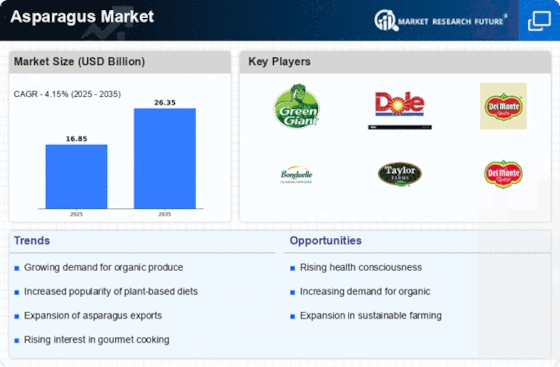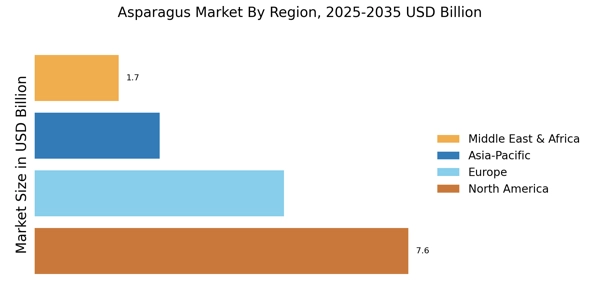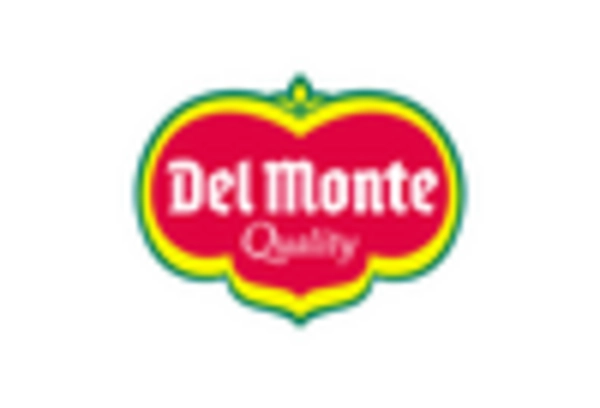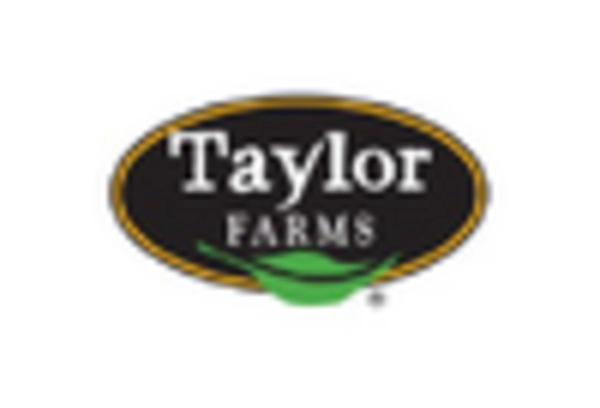Rising Demand for Organic Produce
The asparagus Market is experiencing a notable increase in demand for organic produce. Consumers are becoming more health-conscious and are actively seeking out organic options, which are perceived as healthier and more environmentally friendly. In recent years, the organic asparagus segment has shown a growth rate of approximately 10% annually, indicating a shift in consumer preferences. This trend is likely to continue as more individuals prioritize organic food in their diets. Retailers are responding by expanding their organic offerings, which further fuels the growth of the asparagus market. The Asparagus Market must adapt to this demand by ensuring that organic farming practices are implemented and that supply chains are capable of meeting the increasing consumer expectations for organic products.
Expansion of Culinary Applications
The Asparagus Market is witnessing an expansion in culinary applications, which is enhancing its appeal to a broader audience. As chefs and home cooks alike experiment with asparagus in various cuisines, the vegetable is being featured in an array of dishes, from salads to gourmet entrees. This trend is supported by the rise of cooking shows and social media platforms that showcase innovative recipes. The versatility of asparagus is likely to attract new consumers, thereby increasing market penetration. Furthermore, the Asparagus Market may see a rise in demand from food service establishments that aim to diversify their menus with seasonal and fresh ingredients, potentially leading to a more robust market presence.
Growing Popularity of Plant-Based Diets
The Asparagus Market is experiencing a surge in interest due to the growing popularity of plant-based diets. As more individuals adopt vegetarian and vegan lifestyles, the demand for vegetables, including asparagus, is on the rise. This dietary shift is not only driven by health considerations but also by environmental concerns, as plant-based diets are often viewed as more sustainable. The asparagus market is likely to benefit from this trend, with projections indicating a potential increase in sales as consumers seek out plant-based options. The Asparagus Market must leverage this opportunity by promoting asparagus as a key ingredient in plant-based meals, thereby appealing to a wider consumer base.
Increased Focus on Nutritional Benefits
The Asparagus Market is benefiting from a heightened awareness of the nutritional advantages associated with asparagus consumption. Asparagus is rich in vitamins, minerals, and antioxidants, which are increasingly recognized for their health benefits. This awareness is driving more consumers to incorporate asparagus into their diets, contributing to a projected growth rate of around 5% in the market. Health campaigns and dietary guidelines that emphasize the importance of vegetables in daily nutrition are likely to further bolster this trend. As a result, the asparagus market is positioned to capitalize on this growing interest in health and wellness, potentially leading to increased sales and market expansion.
Technological Advancements in Agriculture
The Asparagus Market is poised for growth due to technological advancements in agricultural practices. Innovations such as precision farming, automated harvesting, and improved irrigation techniques are enhancing the efficiency and yield of asparagus production. These advancements not only reduce labor costs but also improve the quality of the asparagus produced. As a result, the market is likely to see an increase in supply, which can help meet the rising consumer demand. Furthermore, these technologies may contribute to sustainable farming practices, aligning with the growing consumer preference for environmentally friendly products. The Asparagus Market stands to gain from these developments, potentially leading to increased competitiveness and market share.

















